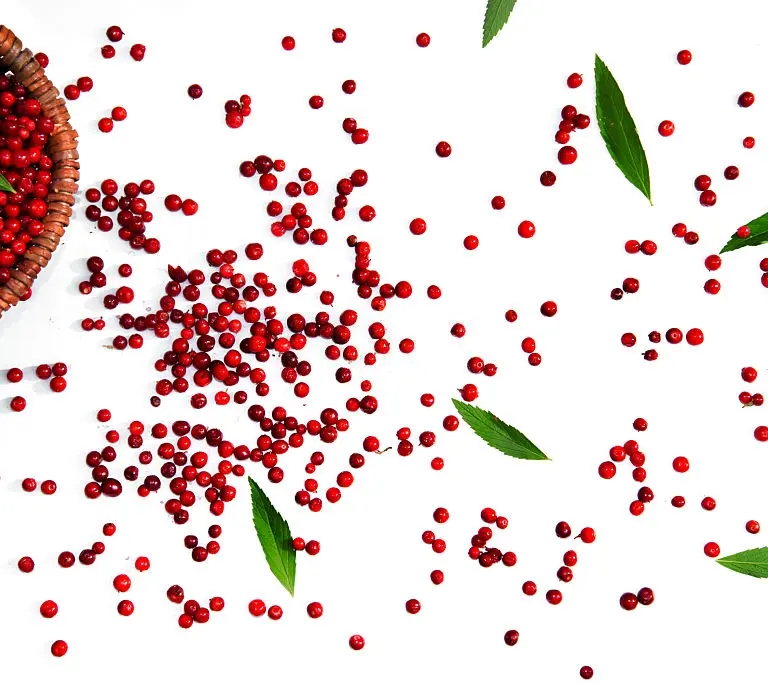The cranberry shrub is one of the most abundant plants in North America. Its berries are often not eaten fresh when picked owing to their tart and bitter taste but rather are consumed in juice form mixed with other fruit juices. Cranberry is consumed for a variety of health reasons such as, urinary tract infections and as a diuretic. It is also used for type 2 diabetes, lung infections, colds and cancers.
Cranberries are jam-packed with nutrients. One cup (100g) of cranberries contains:
- Calories: 46
- Water: 87%
- Protein: 0.4 grams
- Carbohydrates: 12.2 grams
- Sugar: 4 grams
- Fiber: 4.6 grams
- Fats: 0.1 grams
Cranberries also contain an abundance of the following vitamins and minerals:
- Vitamin C; an antioxidant.
- Vitamin E.
- Vitamin K.
How do cranberries benefit our health?
Cranberries help prevent bacteria from attaching to the membrane covering the reproductive system, ultimately preventing a very large percentage of urinary tract infections. However, its role in treating urinary tract infections is limited, therefore it is more preventive than curative.
Cranberries contain salicylic acid, which is usually found in most fruits as well. Salicylic acid is the main ingredient of aspirin and it plays a primary role in relieving swelling resulting from inflammation, preventing blood clots, suppressing tumor formation and preventing cancers.
Benefits of Cranberry
- Cranberry & Urinary Tract Infections
Eating cranberry regularly either as cranberry juices or cranberry extract pills can greatly and effectively protect against urinary tract infections, especially in women, who are more susceptible to such infections. Some studies have shown the role of cranberries in killing bacteria and treating infections, but most of these effects are still under study.
- Cranberry & Prostate Health
Studies have shown that cranberry plays an effective role in relieving the symptoms of prostate enlargement, as well as relieving the urogenital symptoms associated with the condition.
- Cranberry & Colds
Research has shown that consuming cranberry pills or juice reduces the symptom severity of colds. It’s preventive role here is limited, however its role in relieving symptoms is considerable.
- Cranberry & Bacterial Gastroenteritis
Studies have shown that consuming cranberry pills or juice for about 3 months may eliminate H.pylori; the stomach germ that causes stomach ulcers in adults and children.
- Cranberry & Metabolic Syndrome
Some studies have shown that eating cranberries regularly may increase the concentration of antioxidants in the blood which helps the body in controlling the symptoms of metabolic syndrome, however it does not have a clear role in the reduction of blood pressure nor diabetes control.
- Cranberry & Urine Odor
Ongoing research concluded that cranberry reduces urine odor in people with difficulty urinating.
- Some of the benefits of cranberry that are still being studied:
- Chronic fatigue syndrome (CFS).
- Rapid healing of wounds.
Side Effects of Cranberries
- Cranberry for Pregnant & Breastfeeding Women
There is insufficient information about consuming cranberries during pregnancy. Its effects, if any, on the fetus are also unknown, therefore it is advised to avoid consuming cranberries during pregnancy.
Moreover, some studies have shown that cranberries may appear in the milk of breastfeeding mothers, consequently, nursing mothers are advised not to consume cranberries during that period.
- Cranberry & Children
Cranberry is safe for children’s consumption.
- Cranberry & Aspirin Allergy
Cranberries contain salicylic acid, which is mainly found in aspirin. Therefore, it is completely prohibited for a person with aspirin allergy to consume cranberries.
- Cranberry & Gastritis
People with gastritis or impaired stomach acid secretion are prohibited from consuming cranberries, because these conditions greatly increase the absorption of vitamin B12 from the gut resulting in the possibility of its concentration reaching toxic levels in the body.
- Cranberry & Diabetes
Cranberries mainly contain carbohydrates and fiber, which contain simple sugars such as fructose, sucrose and glucose. Moreover, some cranberry preparations contain added sugar to improve the taste. Therefore, diabetics are advised not to consume copious amounts of cranberries.
- Cranberry & Kidney Stones
Cranberry juice and pills contain large amounts of the chemical oxalate. Some evidence exists around the possibility of cranberries boosting urine-oxalate levels and increasing the risk of kidney stone formation. Since oxalate is a major component of kidney stones, people with kidney stones are advised not to consume cranberry pills or juice. Healthy people are also advised not to over-consume cranberry pills.
- Some side effects of consuming cranberry pills:
- Stomach upset.
- Nausea and vomiting.
Drug Interactions with Cranberry
- Cranberry & Warfarin
Warfarin is used as a blood thinner to slow down blood clotting. Cranberries interfere with the elimination of warfarin from the body, retaining it for longer than necessary, which increases its effects and may lead to bleeding or bruising under the skin. Your doctor may have to reduce or change the usual dose of warfarin if prescribed. Therefore, if you are taking warfarin, inform your doctor before you start using cranberry pills.






